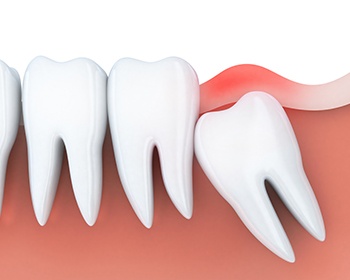Wisdom Tooth Extractions - Lincoln, NE
Safe & Comfortable Wisdom Tooth Care

Are you or your child experiencing a dull, persistent pain towards the back of the jaw? Does the bite feel different, or does it seem like there is pressure being placed on the back teeth? These are all telltale signs that the wisdom teeth are coming in. Left alone, these symptoms can become much worse, but fortunately, we can put a stop to them with a wisdom tooth extraction in Lincoln, NE. We’ve performed this procedure countless times here at Pioneer Greens Dentistry, and we’d be happy to help your family so you can avoid more serious issues in the future. Give us a call today to learn more or schedule an appointment.
Why Choose Pioneer Greens Dentistry for Wisdom Tooth Removal?
- Same-Day Appointments Available for Patients in Pain
- Multiple Types of Sedation Available
- State-of-the-Art Facility
Why Do the Wisdom Teeth Exist?

The wisdom teeth are the most commonly extracted teeth in the world, so this begs the question, why do they exist in the first place?
They actually used to be very handy for our caveman ancestors, whose rough diet usually led to tooth loss by the time someone was in their late teens or early twenties. The wisdom teeth usually replaced the molars that often would have fallen out by this age. Now, thanks to advancements in dentistry, they are no longer necessary, but this means they often become stuck, or impacted while trying to come in because there isn’t enough room in the mouth. The best way to handle this is to simply remove them, which our team can do in a single appointment here in our Lincoln dental office.
Wisdom Tooth Extractions FAQs

Do you have questions about wisdom teeth? Would you like to know more about the extraction procedure before you move forward? We understand and are happy to answer any questions you may have. We believe in honesty and transparency so you make the best choice for your smile and oral health without unpleasant surprises, which is why we’ve answered the most common questions below. So if you need clarification or have other questions, do not hesitate to discuss your concerns with us!
When Should Wisdom Teeth Be Removed?
Most of the time, wisdom teeth start developing underneath the gums and erupt between the ages of 15 and 25. As a result, this age window is usually when wisdom teeth need to be extracted, meaning we will be monitoring you or your child’s mouth for signs of trouble during this time and beyond.
What Is the Wisdom Tooth Extraction Process Like?
The extraction process may be different from patient to patient. While one patient’s wisdom teeth may have already erupted, another’s may still be underneath the gum tissue. In the first case, we may be able to simply and gently rock the wisdom teeth back and forth until they come out. In the second, we may need to open the gums and surgically remove them. Sometimes, the wisdom teeth must be broken into smaller pieces to facilitate their extraction. Regardless of which method we use, you will be completely numb and comfortable during the entire procedure.
What Could Happen If I Do Not Have My Wisdom Teeth Removed?
If your mouth does not have enough room for wisdom teeth, they need to come out. Not only can they put pressure on your other teeth, shifting them out of position, but they can also lead to oral infections. Many times, wisdom teeth develop at an angle, and when they erupt through the gums incorrectly, little nooks can accumulate bacteria, causing gum disease, painful cavities, or another potentially dangerous condition for your smile.
What Should I Do After Getting My Wisdom Teeth Removed?
The aftermath of your wisdom tooth extraction is very important. Before you leave our office, we will give you specific instructions so you can heal as quickly and effectively as possible. As you heal, you will need a blood clot to form over the site(s) and will need to keep your mouth clean in order to prevent an infection known as dry socket. For at least 24 hours after the procedure, you should have plenty of fluids, but do not use a straw, which can dislodge the clot. During this time you should also get lots of rest, meaning you will need to take at least one day off from work or school.




